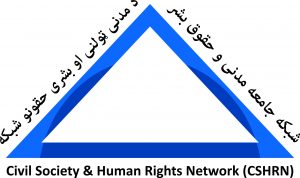The three days “advocacy workshop for transitional justice in Afghanistan” was organized and conducted by the Civil Society and Human Rights Network (CSHRN) in close cooperation with the UNAMA Transitional Justice Section, the International Center for Transitional Justice (ICTJ), the Foundation Open Society Institute Afghanistan (FOSIA) and the United State Institute of Peace (USPI) in the Capital INN Hotel in Kabul from 25th to 27th October 2009.
18 representatives of civil society organizations from Kabul and 13 representatives of civil society organizations from different provinces such as Herat, Kandahar, Balkh, Kondoz, Takhar, Faryab, Ningarhar and Bamyan were invited to participate in this workshop. The workshop was opened by a recitation of some verses of Holy Quran by Mr. Ismail Zaki, thereafter Mr. Mohammad Naim Nazari, the executive coordinator of CSHRN, welcomed the participants and introduced the strategy and the structure of CSHRN to the participants. Subsequently, Mrs. Morena Mori, the person in charge of the Transitional Justice Section of UNAMA in Afghanistan , Mrs. Karen Williams, the Senior Program’s Fellow in Afghanistan of ICTJ, Mrs. Nilofar Sakhi, the Director of the Foundation Open Society Institute in Afghanistan FOSIA and Mr. John Dempsey, member of the United State Institute for Peace in Afghanistan introduced their organizations.
Ms. Morena Mori explained the concept and need for transitional justice in Afghanistan according to the instructions and the agenda of the workshop.
Following, Ms. Morena asked the participants to watch a documentary film about transitional justice and the role of truth finding commissions in different countries such as Peru, South Africa , Almaghreb (Maroco) and Chile . The producer of this documentary film emphasized the effective role of truth finding commissions and a correct realization of the transitional justice concept.
During the discussions after the movie, the participants concluded that transitional justice does not concentrate only on punishment and revenge, but that transitional justice puts the focus on past crimes for which the perpetrators of these crimes still insist that they did not do anything wrong. It means that transitional justice is ethical and addresses the conscience of those people who committed crimes and violated human rights of other people. Besides these points, the film emphasized the role of victims within the process of transactional justice which could be to help in revealing cases, finding the truth and documenting the past crimes.
The second part of the workshop was about the needs for transitional justice and the process itself. Mr John Dempsey from the United State Institute of Peace gave an instructive lecture in this regard, explaining about the importance of identification of key players and the effective approach of advocacy.
On the second day, Mr. Naim Nazari summarized the activities of the previous day and Ms. Najiba Ayubi, Director of Killid Group and member of the CSHRN board gave a valuable lecture on advocacy and the tools of advocacy. After this session, Mr. Aziz Rafiee Director of ACSF, gave a comprehensive lecture about the role of civil society regarding advocacy for transitional justice. Mr. Rafiee pointed out during his speech the negative role of cruel regimes and ex governments of Afghanistan on perpetuating the occurrence of organized crimes and human rights violations. He said that the majority of these violations happened during arbitrary regimes and that the system perpetuated the culture of violation and amnesty in Afghanistan.
The third day opened by summarizing the previous day activities by Mr.Naim Nazari.
Thereafter, Mr. Ahamd Seyar Lalee had a presentation on advocacy, networking, coalition, leadership and management. The team of CSHRN including Naim Nazari, Wazir Ahmad Khorami and Ahmad Seyar Lalee answered the questions of the participants.
At the end of this workshop. Ms. Marieke Wierda from ICTJ divided the participants into three working groups and Mr. Yasser Waris from UNAMA facilitated this session and explained what the working group needed to do. The first group started to work on an action plan for transitional justice, the second on the preservation of mass graves in Afghanistan and the third group on the establishment of a truth finding commission.
The team leaders Mrs. Shourangaze, Mss. Waheeda Hafiz Bakhtari and Mr. Mujebu-ra-hman Khilwatgar presented the results of the working groups.
The three days workshop ended with a summary and an evaluation of Mujeeb Khalvatgar, the person in charge of the media section of FOSIA and Mr. Naim Nazari, the executive coordinator of CSHRN. A meeting to discuss on the follow up of the workshop among UNAMA, FOSIA and CSHRN took also place.
